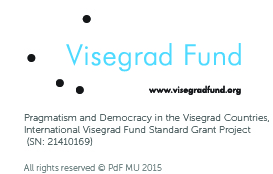The conference is a part of the International Visegrad Fund Standard Grand Project (SN: 21410169) Pragmatism and Democracy in the Visegrad Countries. The project is dedicated to introduction of pragmatism as a basis for alternative discourse in the areas of politics, aesthetics, epistemology, and education.
The Brno conference is focused on education. Its main aim is to bring together experts on philosophy of education and educators who strive to link modern educational philosophy with educational theory and practice. Thanks to the work of John Dewey and his idea of education as the most important generator of the democratic society, pragmatism can play a role of the mediator for an alternative educational discourse. The intended outcome of the discourse is formation of a viable and cooperative body of (not only pragmatist) experts that could contribute to positive change of the educational systems in our countries.
The central conference topics:
Pragmatism and education
What is specific in pragmatist education? What can the European tradition of education pick out as inspiration from pragmatism? What can we learn from the Deweyan approach to education? Are there any connections between pragmatism and other approaches to education and educational philosophies?
Theory and practice
What can we learn from the pragmatist concept of theory and practice? Can we cross the traditional difference between theory and practice in education? What character does the effort to understand the relation between theory and practice in the pragmatist way have?
Alternative Educational Research
Can pragmatist educational philosophy offer anything important to educational research? Is there educational research – whether only designed or already running – that are inspired by pragmatist epistemology or the other alternative epistemologies close to the pragmatist one (phenomenology, hermeneutics, constructivism, cognitivism of the 2nd generation)? What can this research reveal to us?
History of educational pragmatism in the Visegrad Countries
Were there attempts to bring pragmatist thinking into our (Visegrad Countries') educational systems? Did these attempts have a real impact on our educational systems (reforms, changes in a system of education)? How deep and true to pragmatist thoughts were these attempts? Have the reforms or changes left some traces in the systems?


